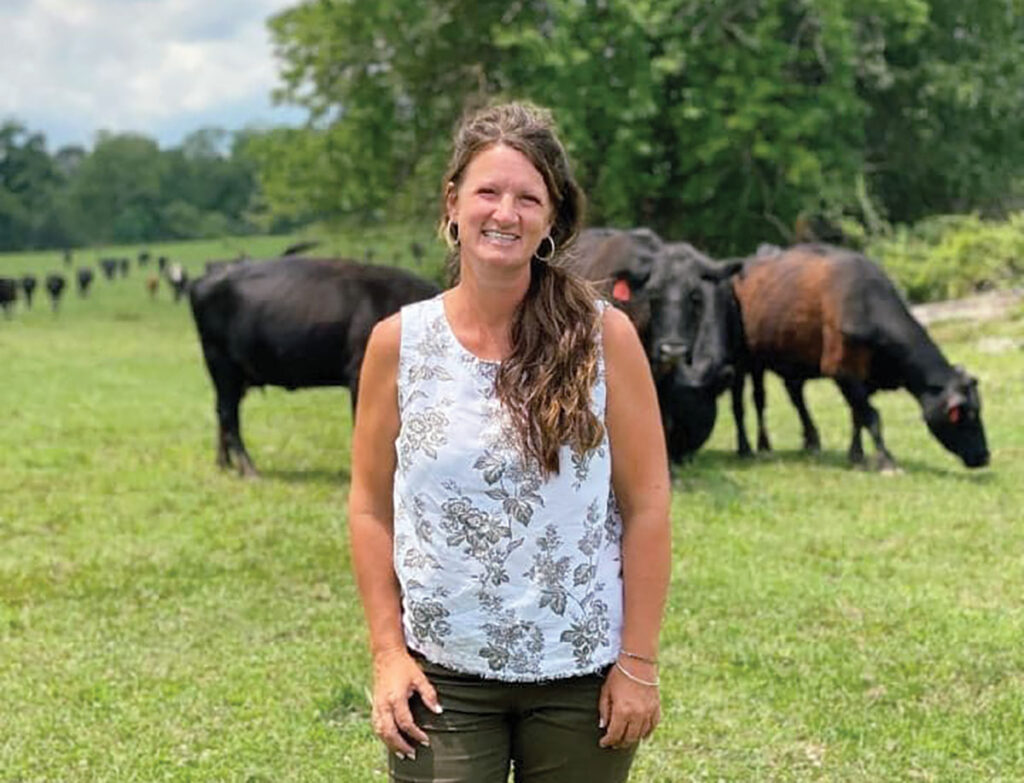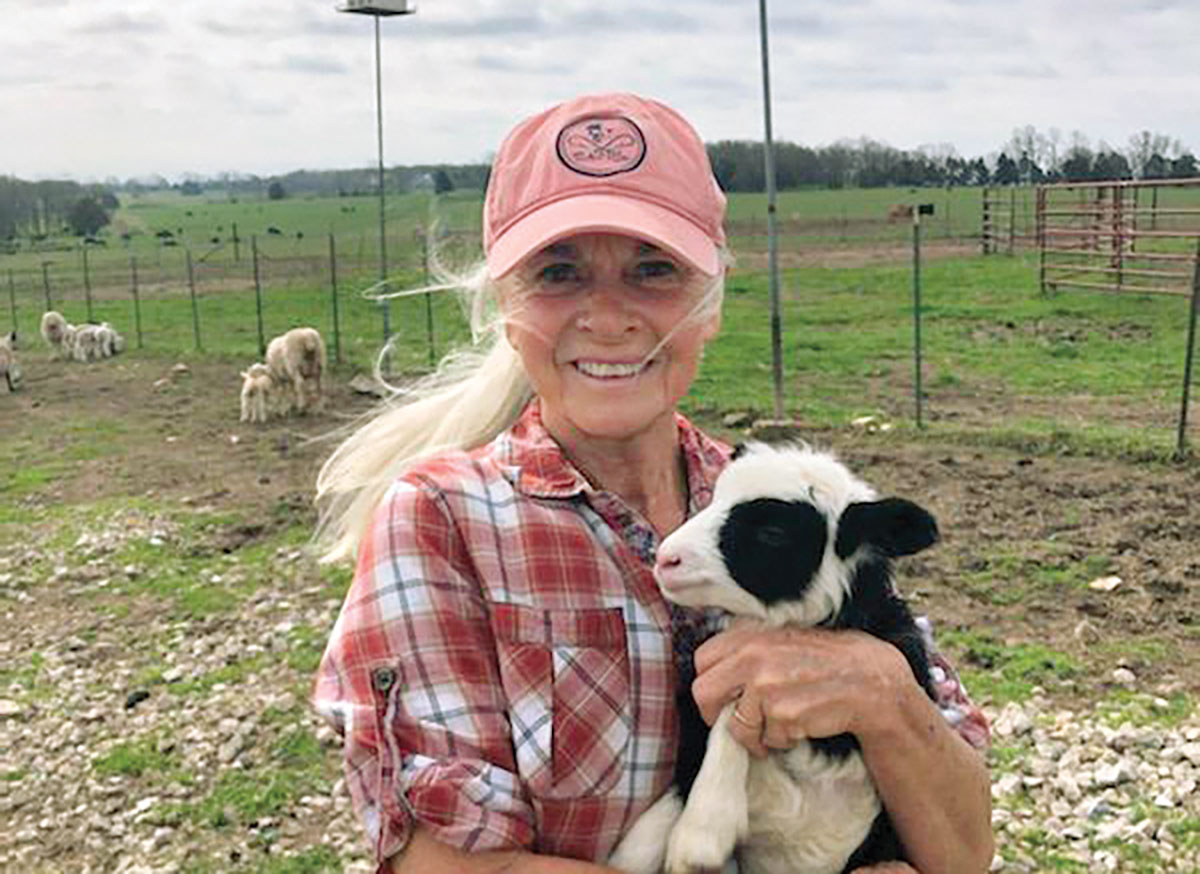
Michele Broxton returned to her family’s farm, changing it into a profitable venture
ROLLA, MO. – Michele Broxton of Phelps County, Mo., is a very busy lady.
In 2009, when her dad Floyd Huffman, who operated Huffman Mobile Homes for many years, got sick, she quit her job in human resources in Nashville, and moved home to Rolla, Mo., to follow in her family’s tradition as the fourth-generation to farm in Phelps County, the third on the same family farm.
Ozark Farms, located on the outskirts of Rolla, Mo., now includes a 600-acre black Angus cattle operation, a spacious campground, a mobile home park, an added slice of agri-tourism, and a soon-to-open commercial kitchen and store.
“Grandma and Grandpa Huffman bought the farm across the road in the early 1900s,” Michele said. “Today, Grandma Mansbridge’s farm is a gas station and a subdivision. My dad and my grandfather, Lester Huffman, had mobile homes for years but they also always had cattle. My dad would buy steer calves at 450 pounds from the sale barn, put them on grass and then sell them 180 days later at 750 pounds. My dad said growing up, Grandpa said ‘always keep some cows.’”
“When Dad needed help, I came home and started trying to help him figure out how to get a handle on a variety of small businesses that had become big over 50 years. There was the cattle operation, the mobile home sales, remodeling, the mobile home park – many of those trailers were old and in disrepair. I stepped into the leadership after Dad passed away. We were having to borrow money to pay the property taxes. We were in trouble and I knew it, but the question was, what to do about it. I don’t think I slept well for a decade.
“I bought one of the early editions of Quick Books and that allowed me to make spread sheets and run reports, to separate out the different businesses. Up until then, we were still doing everything using paper ledgers like Grandma and Grandpa did in the 1940s. We needed a better understanding of our business financial health. After six months, I could see what was making money and what wasn’t. One thing I learned early on: Figure out a way to turn a liability into an asset, whether it’s a building, a field, a property, knowledge — how do I move it from the expense column to the asset side?”
A large metal workshop, on the edge of the property was full of 30 years of unused stuff, so she cleared it by hosting an auction, generated some capital to pay down a little of the debt, and a space she could rent out.
“It had been an expense and now it carried its own weight, making money,” Michele explained.
When it came to the farm and the cattle, the same principle applied, but there was another dynamic to be considered.
“I grew up around the cows and the hay but it was the men in my family who worked those aspects of the operation, not me,” Michele said. “Nobody really wanted a girl in the hayfields. I brought them lemonade and cookies because that’s what Mom and I did. That was our contribution. I couldn’t be out there, bucking bales and working cattle with the boys because they didn’t want a girl out there with them. When I moved back, I had to learn everything from the ground up.
“I’m so grateful to the longtime farmers and our local veterinarian for taking me under their wings, especially in those early years. I felt a heavy responsibility for the animals in our care and I wanted to make sure I did right by them.”
Once home, Michele had some hard decisions to make, one of which was converting her father’s long-term steer operation to a cow/calf pair enterprize.
“I felt guilty making big changes to our family business and to be honest, I bawled my eyes out many times,” she admitted with a little laugh. “Same as when I sold my grandmother’s farm to help settle debts when Dad passed away. There’s an old saying in business – the first generation starts it, the second generation builds it, and the third generation ruins it. I was petrified that was going to be me. I prayed and asked wise people for advice and then I tried to follow the data.”
“I’m so grateful to the longtime farmers and our local veterinarian for taking me under their wings, especially in those early years. I felt a heavy responsibility for the animals in our care and I wanted to make sure I did right by them.”
— Michele Broxton
Michele credits Ken Lenox, another cattle producer and neighbor as well as Dr. Justin Berger, the local veterinarian, located just across the road from her farm, with educating her in so many areas of learning how to run a cattle operation.
“I followed Mr. Lenox, worked with him and asked him about a million questions,” she recalled with a laugh.
“He told me to keep a log of everything I did that first year and, chances were, on that same day I’d be doing the same thing the next year. After a year and a half of reading everything I could get my hands on and following him around, I bought my first herd of 13 first calf heifers with a calf on the ground. When they all bred back and the calves and mommas did well, Doc Berger gave us the thumbs up and I thought, ‘OK, I’m ready.’ We sold our steer calves and bought open heifers at the sale barn during that spring. I culled them down to 50 that we bred. I’ve always kept the two herds separate. After that, I bought 26 bred heifers from Ken and the next year, another 26. I now have 100 momma cows with four registered Angus bulls. The cows are not registered but I typically use registered bulls.
“I’m thankful for all that I learned, all that Dr. Berger and Ken Lenox taught me. We had no vaccination program, no cross-fencing. I was forever chasing cows up and down the highway and something was sick almost all the time. We had about a 30 percent loss rate, as basically my dad was taking the scraps that were left at the end of the day at the sale barn. Dr. Berger told me that was the best education I could get, trying to nurse those steers back to health.”
And as Ken Lenox and Dr. Berger both taught her, she isn’t really in the cattle business as much as she is in the grass-producing business as good grass means healthy growing cattle. She learned the importance of cross-fencing to accommodate rotational grazing and she now vaccinates twice a year.
She is also grateful for the two years at home with her dad before he passed away, a time when she learned so much, from the small businessman and also from her mother, a true genteel Southern lady, who still lives on the farm.
Michele has now ventured into the up-and-coming field of agro-tourism as she has added two Airbnb homes to her growing agriculture empire.
“In past generations, people had grandparents, aunties, neighbors who had farms they could visit but it’s harder to plug into that now. People still want that pie-cooling-on-the-window-sill feeling of a visit to the family farm and it makes me so happy to be able to give them a place to make that connection,” she said with a grin.
“We’ve been baking cinnamon rolls, banana bread, chicken pot pies, and fresh bread since 2015 and we began shipping those items in 2020. People like coming to the farm, enjoying the baking, feeding the chickens, collecting the eggs, picking everything from berries to garden veggies to corn in the field and taking it back to their picnic table. There’s nothing like enjoying something fresh from the farm.”
Michele Broxton’s Ozark Farms latest project is the addition of a commercial kitchen to keep all that going. And she does it all as a single mom, along with her family which includes her own children, both those born and adopted into the family — Ava (15), Rich (12), Henry (5) and Luci (3), and several foster children.







